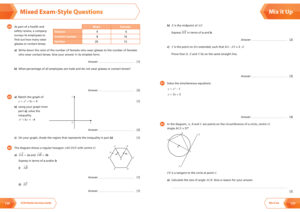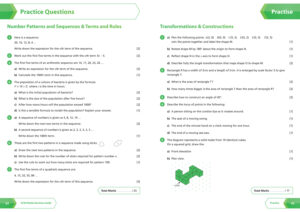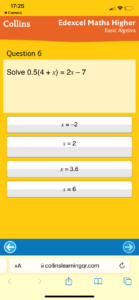Summer exams for students, and for teachers for that matter, are assessments that are worked towards for the whole of the school year. With such high stakes surrounding GCSE exams, students often feel a heightened amount of pressure in the lead up to them. As well as teaching students the information needed to pass exams, it’s also important to make sure students know how to revise to give them the best chance of successfully preparing for their exams. Have you ever thought about a student who excels in a classroom, and seems to answer all questions correctly when asked, but performs poorly in exams? If the answer is yes, then these tips are for you!
Videos for revision
Watching videos to revise is an effective method for students to go over various topics. Students can watch videos to refresh their memory on a particular unit, before attempting exam style questions, or they can first attempt exam-style questions and watch the video that models the solutions after.
How Collins Complete Revision & Practice can help
The new Collins Complete Revision & Practice books for maths and science are a great tool for students’ revision as they provide video solutions for exam-style questions in every topic that students can access simply through a QR code. An example of a video that can be found in the revision guides is shown below.
The videos are clearly explained and designed to minimise distraction through colours chosen, simple font, and minimal background images.
There are many great content creators on YouTube who provide explanation videos for free, including:
- Corbett Maths, a maths teacher who has created over 800 videos explaining key maths concepts from KS2 to A level
- Mr Bruff, an English teacher who creates videos for GCSE and A level English Language and Literature
- Freesciencelessons, a channel with playlists dedicated to GCSE combined and single sciences
And on TikTok there is a growing community of teachers creating short engaging videos to help students, such as Maths Crunch (that’s me!) where students can find demonstrations of how to solve KS3 and KS4 maths problems.
Practice exam questions
A challenge that many students face is identifying what an exam question is specifically asking for, and what method is needed to apply to that question. Exposure to exam questions is critical to combat this challenge. Such exposure can occur after a topic is taught in class, or possibly after a sequence of lessons where students have the solutions modelled to them thereafter.
Exam questions can be a powerful tool for students, providing an expectation of what they could be tested on and knowledge of how examiners like to see questions answered. Such practice helps to better prepare them, which can even reduce pressure or stress as a result.

How Collins Complete Revision & Practice can help
Complete Revision & Practice books include exam-style questions for a range of topics in the Mix it Up section.
The guide also contains a workbook with Practice Exam Papers.
Exam questions can be a powerful tool for students, providing an expectation of what they could be tested on and knowledge of how examiners like to see questions answered. Such practice helps to better prepare them, which can even reduce pressure or stress as a result.
Practice, practice, practice!
It’s no secret that to help improve performance in exams, practice is key! Reading over notes or memorising formulas will not help if students do not know how to apply them. Completing different styles of questions is a key component of revision, as it helps students to prepare for any eventuality in their exams.

How Collins Complete Revision & Practice can help
Collins Complete Revision & Practice includes Review Questions as well as Practice Questions for every topic.
The targeted questions test students on what they have learnt from the revision section of each topic, thus testing understanding and preventing the memorising of information. This ensures that students are digesting information and applying it, whilst also being guided on what may be expected in an answer through being shown the number of marks that each question is worth.
Keep questions short and snappy
Help students maximise the marks they get from the AO1 questions early in the paper. Students can make easy mistakes on these questions, and often have similar misconceptions surrounding certain topics. Ensuring that students are being questioned through quick fire questions, short quizzes or recap activities can be an effective way to test what students know and make any necessary interventions.

How Collins Complete Revision & Practice can help
Complete Revision & Practice incorporates quick questions for each topic within the book, providing online quizzes and using multiple choice questions to allow students to access foundational knowledge for each topic. For example for Indices in Maths, knowing that the result of any number raised to the power of 0 is 1, or that to find the result of any number that is raised to the power of a half means to square root it. Here is an example of a question from a Quick Recall Quiz from the guide, accessed via QR code.
Make a revision schedule
With so many different subjects to revise for, planning time for revision by making a schedule can help to manage time and ensure that students are using their time effectively. It’s also important to make sure to include time for breaks! Writing up a schedule helps students to have an overview of what needs to be covered and track their progress to be able to tick off what has been done. Here’s a free template students can use to create their revision schedule.
We hope you find these tips are helpful in preparing students for summer exams. What are some of your top revision tips for students?
By Ama Dickson
Ama Dickson is a secondary school maths teacher who has great enthusiasm for teaching maths. She is in the second year of her teaching career, and runs a social media account, Maths Crunch, on TikTok and Instagram, where she provides math solutions for Key Stage 3 and 4 mathematics. With over 15,000 followers, the Maths Crunch community continues to grow and help students to solve various problems! Maths Crunch can be found at:
TikTok: www.tiktok.com/@mathscrunch
Instagram: www.instagram.com/mathscrunch
Complete Revision & Practice provides a revision guide, workbook and practice paper in one book, now with interactive recall quizzes, updated practice questions and worked solution videos for maths and science. Plus, you can now save an extra 30% on our regular school prices by using Revision30 at checkout – our best value offer ever!*
Find out more about GCSE 9-1 Complete Revision & Practice
*Does not include SNAP revision. UK schools only. Ends 30.4.2022. Not to be used in conjunction with any other offer.



